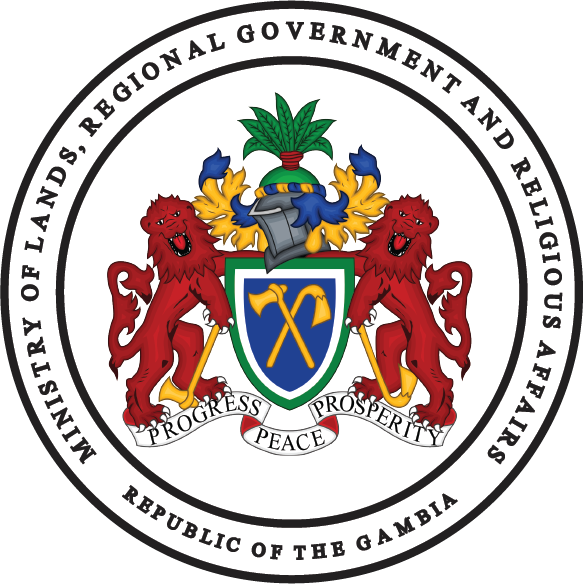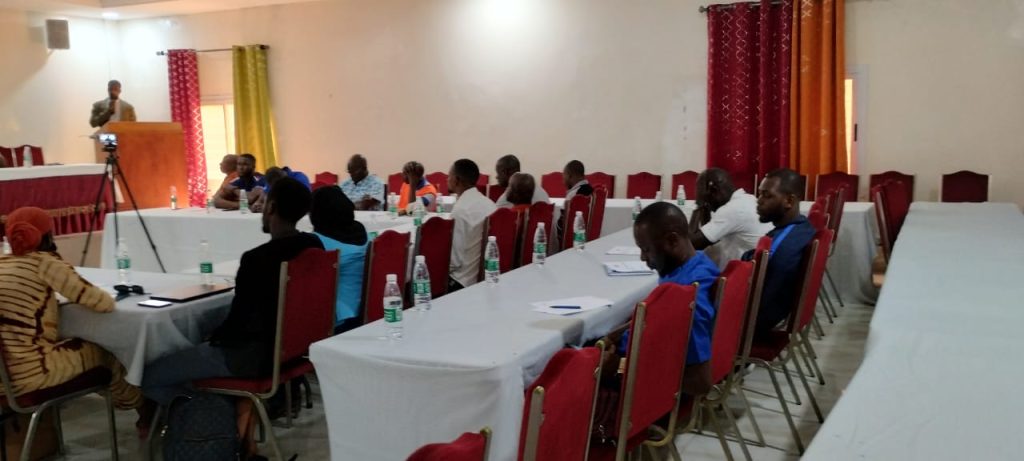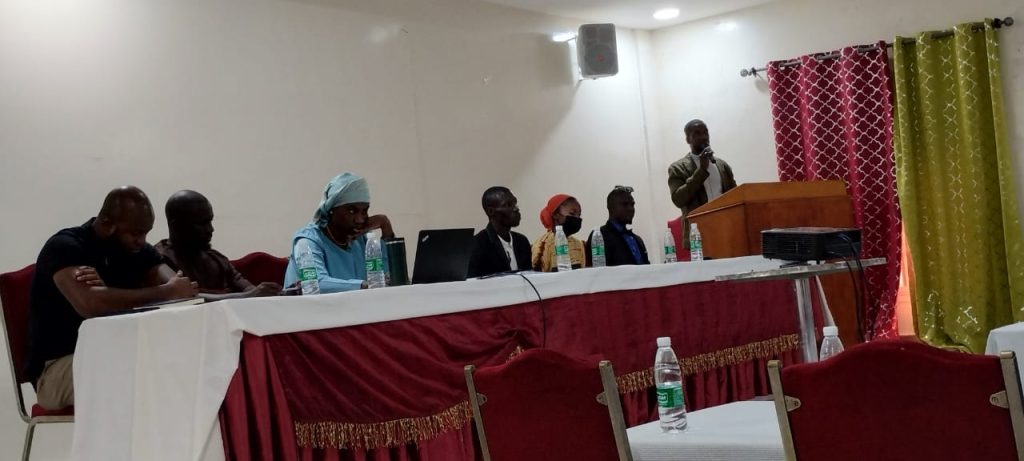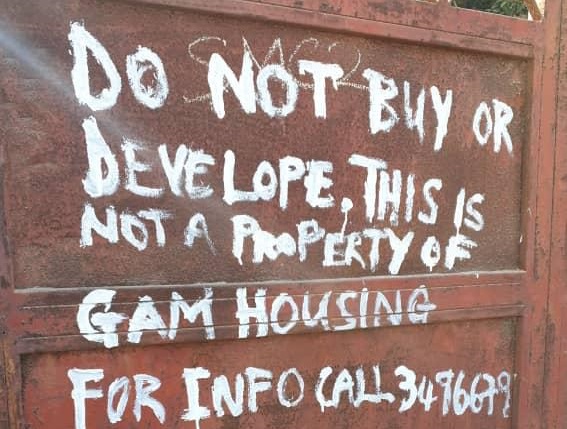By Yankuba Jallow
The Gambia Government’s plan to regulate the real estate sector is not going as planned. Despite President Adama Barrow’s numerous promises, the Gambia Government has not taken serious steps to regulate the real estate sector.
The Gambia Government has promised Gambians that they will come up with regulations for the real estate sector, but they still could not fulfill their promise. Some real estate dealers have accused the Government of “dragging its feet” on the much-anticipated regulations.
Since the change of regime in January 2017, the number of real estate companies has spurred, but equally, the number of victims of real estate scamming has increased to a point that many Gambians have been making demands for regulation of the sector.
The story seeks to examine the real estate sector and why the Gambia Government could not still enact legislation to regulate the real estate sector despite the promise made by President Adama Barrow. The problems of the real estate sector are two-sided. One is the Government’s failure to regulate the sector and the other aspect is the real estate companies’ drive to exploiting the system using it to their advantage by amassing land and money. The land laws of the country do not cater for the real estate sector. The land laws were passed over 30 years ago. Some of them were passed during the colonial era – before the Gambia became an independent state.
The country has over 100 real estate companies and agencies engaged in the sale, purchase and rental services. They receive deposits from customers in exchange for land.
Unscrupulous dealers have been registering real estate companies and collecting money from ordinary people in the name of land transactions. Many people have become victims in the end and have been demanding justice. The country lacks legislation to protect customers from real estate scamming.
In the Gambia, almost everyone can trade in land without any pre-requisite qualification or license. No authority performs oversight over the real estate industry. The Government does not subject the real estate dealers to checks as they operate freely. It is possible for anyone to enter the real estate trade.
The irony in The Gambia is that the Government is not leading the process of regulating the real estate sector. The Gambia Government is facing criticism for dragging its feet. Some of the real estate companies are pushing for regulation to save the industry from unscrupulous companies or agencies through the Association of Real Estate Companies (AREC).
“Successive Governments have not been proactive by foreseeing the problems an emerging real estate industry will face by introducing legislation as a means of ‘prevention rather than cure’,” Musa Janko Ceesay, the President of AREC said.

Many Gambians, including the victims of real estate scamming, have been demanding regulation. The overwhelming majority of the real estate companies in the country are facing legal disputes with their customers in court for allegedly scamming them.
In the Gambia, the name “real estate” is synonymous with “scamming” because of the activities of some of the dealers. In their recently held annual general meeting, all the real estate representatives admitted that unscrupulous traders pollute the real estate industry. The few dealers who attended the AGM said the activities of the unscrupulous dealers are affecting the whole sector by dwindling public trust and confidence in them.
Many Gambians, including those in the Diaspora, have asked the Government to pass a moratorium suspending the registration of new real estate companies while they work on a land policy and legislation around the sector to regulate the actors.
“Other countries regulate their real estate sector. We don’t have anything like that. We are operating just like that. We, AREC, are pushing to be regulated, but the Government is dragging its feet,” Musa Janko Ceesay, the President of AREC stated.
The President of the Republic has been talking about the real estate sector in his public addresses, including the State of the Nation Address at the National Assembly. The President of the Republic promised the Members of the National Assembly that the Government would introduce a Bill regarding the real estate sector. He gave several timelines which he never fulfilled. The latest timeline was 2023.
Foroyaa’s inquiry revealed that there is no Bill drafted until now. A source in the Government said the process is stagnant.
“Can you imagine a small Gambia has over 100 real estate companies? This is alarming. They are all rushing to grab lands from the poor people and then start their operations. It is not easy to believe in any one of them because they are all scammers. Most of my colleagues here in Italy have made deposits to the companies through their family members in the Gambia. They have all regretted it now. They cannot still get their land or money,” said Musa Jallow, a Gambian in Italy, Europe.
Lamin Bayo, a trader in Serrekunda, said the number of companies engaged in the real estate sector is many, adding that it should be a cause for concern.
“You would expect that having more companies engaged in a business and doing the same thing, there will be quality service and improvements. If you turn around and look at the real estate companies we have, they do the same thing and say the same things. They are scrambling for the same spaces. I do not know why the Government is wasting time to regulate them. The people are crying. It is all over the media. The Government is aware of it. The records are at the court for the Government to see,” Lamin Bayo said.
Aisha Baldeh, a Gambian and a teacher, said the last thing she will do is to invest her money in real estate companies.
“I want land, but I won’t risk putting my money in any of the real estate companies. My sister is a victim. I know many colleague teachers who have become victims of real estate companies. The Government should regulate them because the people have cried enough,” she said.
Faburama Jaiteh, a Gambian in Spain, said he is not considering making any investment in any real estate company in the Gambia.
“We are seeing their advertisements, but we are also hearing the stories of their victims. The Government should regulate them and stop registering new real estate companies,” Faburama said.
A policeman, who is a victim of scamming by a real estate company renowned for scamming customers, spoke on condition of anonymity and said he has reported the CEO of the company to the police.
“They have been telling me it is a civil case because we signed a contract. Why is the Government allowing him to operate when the number of victims is huge? The Government should stop registering new companies and then regulate them. As for my money, I will do everything possible to get back my money. I don’t need his land because he does not own the land he showed me. I spoke to the family that owned the land and they told me they did not sell the land to him,” the young policeman said.
Two sources in the Gambia Government responsible for the real estate sector have stated that there is no Bill drafted seeking to regulate the real estate sector. The only thing that happened was that a drafting team was constituted by the Government, but the team is dormant. The two sources, who spoke this reporter on condition of anonymity, said the Ministry of Lands informed them that they were looking for funds and then hired a consultant and finally they would get back to them.
Foroyaa has been reporting about the stories of victims of real estate scamming. Some paid hundreds of thousands to the companies while others exchanged vehicles for land. The fight for justice for the victims of the swindling activities of real estate dealers is only by the victims themselves. The Government is not taking active steps to address the problems despite President Adama Barrow’s repeated promises that the Government will regulate the sector.
As a result of the reporter’s investigation and report, a real estate dealer is standing trial at the Brikama Court on 114 criminal counts of ‘obtaining money by false pretence.’ The CEO of Gam Housing is alleged to have amassed Fourteen Million and Forty Thousand Dalasi Two Hundred and Five Thousand Dalasi (D14,040,205) from his customers. The trial is still on. On the other hand, there are some other estate dealers standing trial for the exposure made by the reporter in other courts. We cannot talk about the incidents since the cases have not been decided by the court.
What We Know About the Real Estate Sector
The real estate sector is under the purview of the Ministry of Lands. For one to operate a real estate company in the Gambia it is the same as registering any other business. The process of filing and registration takes not more than 20 minutes. All you need is to fill out the necessary forms and make the necessary payment at the Office of the Registrar of Companies under the Ministry of Justice. Once you are issued with the certificate of registration by the Registrar of Companies at the Ministry of Justice, the person can start operation.
The Ministry of Lands, under whom the real estate falls, does not have a say as to who should be registered and allowed to operate as a real estate company. A senior official at the Ministry of Lands informed the reporter that they do not have a comprehensive list of all real estate companies operating in the country. This is why the Ministry deals with real estate companies through AREC.

Most of the real estate companies have their registered offices where they operate while others have sub-offices where their agents or employees work from. The main offices and the sub-offices all do the same things including receiving payments from people and issuance of receipts.
All real estate companies engaged in advertisement using the media including social media. They display their products in such a way that entices the people. They sometimes come up with promotions with the claim that they are discounting their lands. Some pay for radio and television advert slots to get more audience and visibility. This motivates people to rush to make deposits and payments. The dealers engaged in a range of services including land and property sales, so-called leasing of properties, rental services and construction among other activities.
The real estate sector has no unified land policy. Currently, under the Gambian laws, a real estate company is registered the same way as any other business or company. A real estate dealer only needs a certificate of registration from the Ministry of Justice to enter the trade.
The procedures for the registration of customary land are weak while the process for transferring customary land to leasehold lacks transparency and is cumbersome. Real estate companies mainly buy customary lands from individuals or families and then convert them into estates. In most of those engagements, the Government is not involved. The urban plans and other information regarding land and development are more than three decades out-of-date and cannot guide the fast expansion of urban development. Despite this policy and legislative weaknesses, real estate dealers are busy amassing huge land areas in the name of developing them into real estate for people to buy from them.
When any customer has a dispute with the real estate company, there are only two avenues to seek redress. The Consumer Protection Act does not cover the victims of the real estate sector. Most of the dealers would commit the buyers to sign contracts. One is the police and the other is through litigation in the courts. The most common means of seeking redress by the victims is by instituting civil actions in court against the CEO and the company. These litigations last for years. An inquiry by the reporter at various courts showed that some of the cases take over 3 years and are still not decided. Some of the alleged victims of the real estate scamming have expressed that they lost hope in the court system because it is marred with long adjournments and undue delay. In most of those cases, the reporter’s one-year research at the courts has shown that the real estate CEOs have not been coming and the cases were adjourned based on that.
A process server in the Judiciary of The Gambia said one of the most difficult people to serve summons is the CEOs of real estate companies.
“They don’t pick up our calls. Those who pick up their calls would lie to us. They will agree on a time to meet and then they will fail. If you call them you cannot get them. If you go to their offices, the secretaries or the staff won’t receive the documents. The courts would order for personal service on the CEO and therefore, we cannot just serve anyone – it has to be them,” the process server said.
The process server said they are not allowed to speak to the media and this was why he requested his name not to be mentioned.
“Some cases cannot proceed without effecting service on the CEOs of the real estate companies. Though it is not fair on the victims, that is the procedure,” he said.
He said they must serve the CEOs at every stage of the case including hearing dates and judgments.
Musa Janko Ceesay, President of AREC said almost everybody, anybody, can start a real estate company without any pre-requisite conditions.
“Some companies come and register, receive deposits [payments] from people and then disappear. The customers become losers and this is why we need regulations to protect the consumers,” Ceesay said.
He like all other real estate dealers interviewed in this story admitted that the public has lost confidence in the real estate industry because of the unscrupulous activities of their colleagues in the sector.
“We want to gain the confidence of the consumers. Many real estate companies do not care about customer satisfaction. They only want to make more money and then disappear,” he said.
The rate of court cases against real estate companies and their owners (CEOs) is alarming. Among them is the Chief Executive Officer (CEO) of Gam Housing Real Estate Company, Lamin Mboge, he is facing over 110 criminal charges at the Brikama Court in a single case for allegedly swindling his customers. He is also facing other charges at different other courts. Recently, he was convicted and sentenced to 2 years in jail and was asked to pay a fine of close to 3 Million Dalasi. Like Mboge, so many CEOs of real estate companies have been dragged to court by their customers.
Abubacar Darboe alias BB, a consultant and an expert in the real estate sector, said a good number of real estate companies do not want to be regulated. BB has been pushing the agenda of regulating the real estate sector through the National Assembly. BB addressed the real estate companies at the annual general meeting of the Association of Real Estate Companies (AREC) held on 23 December 2023. AREC has over 60 registered members but the number of companies that attended the annual meeting was less than half of the registered members.
“The hall is not full. I am not surprised that the hall is not full. It is time for regulation. You wouldn’t be surprised if you know the in and out of the real estate sector,” Darboe said.

BB said it is an open secret that so many people have established real estate companies and engaged in the business by exploiting the system because it lacks regulations.
The leadership of AREC said the annual general meeting was widely advertised over the media and the different social media platforms including the WhatsApp group of AREC of the general members.

Musa Janko Ceesay, the President of AREC said the purpose of AREC is to ensure there is a structured environment within which to operate, which ensures that professional or operators within the real estate industry comply as closely as possible to uniform standards, procedures, and rules. The idea is to ensure that the different actors in the real estate sector provide efficient services to the public and also promote public confidence in the industry.
“In collaboration with the Government, the primary purpose is to pursue an economic and legal environment in which a balance is established between the rights of customers to confidently receive a fair and trustworthy deal and the need for real estate companies to invest with certainty,” Musa Ceesay said.
AREC has been proposing a licensing system to be introduced for the different operators in the real estate sector. License A is for developer license, License B is the agency license and License C is the individual license for real estate agents and brokers. License A holders will be issued to companies that own/lease and develop real estate for sale. The holder must be a company with an establishment and would be able to conduct all real estate transactions and hire real estate agents. License B holders will be issued to companies and businesses. It will allow them to open an office to sell and rent real estate and enter into other real estate transactions. The holder won’t be allowed to own real estate for sale. License C will be issued to agents and brokers. The holder would be allowed to sell real estate directly or on behalf of an agency or developer but it does not allow the person to open an office or employ others for this purpose.
“The licensing system will formalize the industry, improve revenue mobilization and create an efficient system to process documents faster,” he said.
AREC is further proposing the synchronizing of the license with the person’s or company’s tax identification number for tax assessment purposes. The AREC leadership said this would reduce the incidence of tax evasion and increase revenue mobilization for the country. The real estate association is also advocating for legislation to be passed to set the qualifications for registering and running a real estate company.
“The license can be suspended or cancelled if a person [or company] contravenes the terms of the license, standards and guidelines, and code of conduct,” Musa Janko Ceesay said.
Money laundering is a crime under the Gambian laws. The real estate sector is free for anyone to trade without any licensing or monitoring system. One of the commonly used methods by criminals who engage in money laundering is purchasing properties or lands from real estate companies using cash and concealing their ownership. According to the Organisation for Economic Co-operation and Development (OECD), Money laundering through real estate is one of the oldest known ways to move and hide illicit funds. It is also regarded as “wash funds”. A report by Global Financial Integrity (GFI) found that more than 2.3 Billion USD was laundered through US real estate from 2015 to 2021. The Gambia has a loose-ended system without any form of regulation. One can imagine how easy it is for any person who does money laundering can purchase properties.
AREC is asking the CEOs of different real estate companies to sign up for a CEO Training Workshop, which for the past 11 months could not be held. The number of companies that sign up out of the over 60 members is 8, according to the President. He said AREC wants more companies to sign up and attend the training.
“We are targeting the CEOs and senior managers in a move to develop their capacity in key areas. This is a move to self-regulate ourselves to some extent; because external regulation will eventually come and most companies will get caught up,” Ceesay said.
When asked which companies signed up for the CEOs Training, President Ceesay said the 8 companies are the top real estate companies.
“Looking at the list, it can be seen that the top companies who are already stable in the industry are the same companies that want to develop more capacity. This begs the question “Why aren’t the other companies making good opportunities.” Are we serious as an industry to change the narratives?” Ceesay asked.
The training , according to Ceesay, would focus on statutory ownership of land, different land tenure systems, the roles of chiefs and alkalos in land administration, what comprises legal transfer, tourism development area (TDA), ethical practices in real estate, accounting for real estate and marketing for real estate.
“We still hope most of the real estate companies would take advantage of this opportunity to subscribe to this training so that we can get the numbers required to conduct an effective training,” he said.
President Ceesay recalled that the Government had asked all real estate companies to submit their documentation including their plans through AREC, but only a few submitted their papers.
“There are more than 100 operators in this industry. We have very few that submitted their documents. The majority did not submit their reports. Are we ready to sanitise the industry?” he asked.
On the problems they are facing in the sector, Ceesay said they face a lot of challenges in trying to get a lease from the Government.
“Most of the companies never leased a land because of the nature of leasing,” Ceesay said.
The leadership of AREC said they have written to the National Assembly to have an audience to advocate the idea of regulation. However, the legislative house has still not responded to them.
Samba B.M Jallow, the General Manager of Senegambia Real Estate Company said AREC has been pushing the Government to regulate the sector, but the Government is not giving them what they want. He explained that the whole idea for regulation will be to bring sanity in the sector marred by unscrupulous activities by the dealers and to protect the customers.
Most of the customers believe in the advertorials and then enter contracts with real estate companies. The problems always come after completing the payments because most of them do not have any land. They will be moving the client from one location to another and will keep on changing locations so long there are third-party claims.
Customers do not ask for guarantees from the Companies such as bank bonds or performance guarantees in case the company fails, they will have something to fall back on and get the money back.
“There should be protection for the customers. They cannot be losing their money just like that. They pay their money in full or advance and yet, they lose. Customers do not ask for performance guarantee or bank bond,” President Ceesay said.
The reporter wrote four (4) letters to the Ministry of Lands seeking interviews regarding the matter. All the letters were not honoured by the Ministry. The reporter also visited the Ministry six (6) times in a view to speak to the legal officer of the Ministry, one Mr Saidykhan or get information from him. All those efforts were unsuccessful. The Ministry has declined to make comments. On two occasions, the reporter attempted to interview the Minister and filled out the form at the Secretary’s table seeking an audience (interview) with the Minister but he was not granted the request. He tried it with the Permanent Secretary and he did not get a response. The excuse the Ministry officials have been giving was either the Minister was sick or the Permanent Secretary had travel.


















